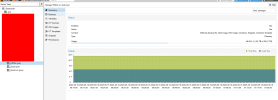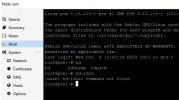Hi there!
I'm struggling with a recent issue. Apparently this hasn't been an issue before as the HDDs have been running 24/7 since I started running proxmox close to 9 months ago.
My HDDs spin down after about 15 minutes of inactivity. This means they are spinning down and back up anywhere from 10-50 times per day. While they are Ironwolf Seagate 8TB rated to spin down quite a few times I do imagine that it's not healthy to spin down this often and it's probably better for them to be spinning 24/7.
I first tried setting hdparm -B but it seems that the drives do not support it, I then tried setting hdparm -S 0 for each of the drives which seemed to set, but the drives are still spinning down after 15 minutes of inactivity.
I am wondering first, how can I check this in proxmox? Right now I am checking by just listening to the server to hear when they spin down, and checking power consumption via a plug similar to the "kill a watt" plug.
Secondly I am wondering what I can do to stop it spinning down so often if at all?
Thank you in advance.
EDIT: After some more searching I see that `hdparm -C` returns "unknown" on all 5 of my HDDs. I assume in that case hdparm is not able to spin up or down the drives and it's something else.
Anyone can help with what possible other options I have?
I'm struggling with a recent issue. Apparently this hasn't been an issue before as the HDDs have been running 24/7 since I started running proxmox close to 9 months ago.
My HDDs spin down after about 15 minutes of inactivity. This means they are spinning down and back up anywhere from 10-50 times per day. While they are Ironwolf Seagate 8TB rated to spin down quite a few times I do imagine that it's not healthy to spin down this often and it's probably better for them to be spinning 24/7.
I first tried setting hdparm -B but it seems that the drives do not support it, I then tried setting hdparm -S 0 for each of the drives which seemed to set, but the drives are still spinning down after 15 minutes of inactivity.
I am wondering first, how can I check this in proxmox? Right now I am checking by just listening to the server to hear when they spin down, and checking power consumption via a plug similar to the "kill a watt" plug.
Secondly I am wondering what I can do to stop it spinning down so often if at all?
Thank you in advance.
EDIT: After some more searching I see that `hdparm -C` returns "unknown" on all 5 of my HDDs. I assume in that case hdparm is not able to spin up or down the drives and it's something else.
Anyone can help with what possible other options I have?
Last edited:



